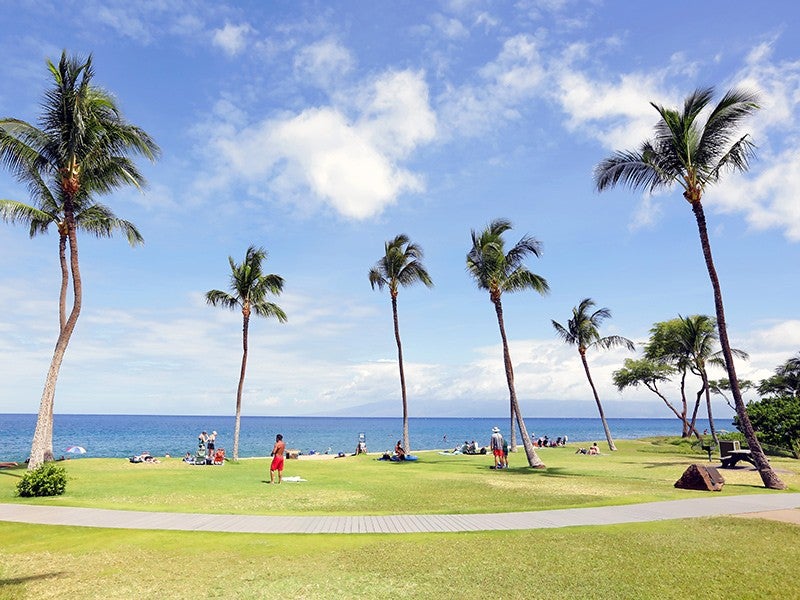Settlement Reached in Dispute over Maui County’s Clean Water Act Violations
Victory
—County commits $2.5 million for projects to divert, reuse wastewater from Lahaina injection wells
Contact
Today, Maui County and four community groups represented by Earthjustice—Hawaiʻi Wildlife Fund, Surfrider Foundation, Sierra Club-Maui Group, and West Maui Preservation Association—lodged a settlement in federal court that requires the County to come up with safer ways to dispose of wastewater at its Lahaina Wastewater Reclamation Facility. For decades, on a daily basis, the County has injected into underground wells millions of gallons of wastewater that travel through groundwater to the popular Kahekili Beach. Under the settlement, the County will spend at least $2.5 million on projects designed to divert treated wastewater from the Lahaina injection wells and reuse that water to meet existing water demands in West Maui. The County will also pay a $100,000 penalty to the federal treasury and, to bring its injection wells into legal compliance, must obtain and comply with a Clean Water Act permit.
“The Clean Water Act requires that polluters pay civil penalties for their Clean Water Act violations,” said Earthjustice attorney David Henkin, who represents the four Maui community groups. “Today’s settlement ensures the lion’s share of the penalty for the County’s years of violations will be invested to solve problems in West Maui, protecting fragile coral reefs and helping to address chronic water shortages.”
“This settlement is a major victory in getting the County to stop using the reef off of Kahekili Beach as its wastewater dumping ground,” said Lucienne de Naie of Sierra Club-Maui Group. “It requires the County to invest in sensible alternatives to injection, meeting existing demand for precious water in West Maui by constructing infrastructure to get treated wastewater to golf courses, resorts, and others.”
Lauren Blickley of Surfrider Foundation commented, “With the projects called for under the settlement, beachgoers in West Maui can look forward to improved water quality and coral reef health at one of their favorite snorkeling and swimming spots.”
Photo courtesy of Jennifer Smith
Algal blooms at Kahekili.
In 2012, concerned that wastewater from the Lahaina injection wells was contributing to algal growth and harming the sensitive coral reef ecosystem at Kahekili, the four Maui community groups filed suit to force Maui County to secure a Clean Water Act permit, which would set limits on the pollutants that can be discharged from the wells. In 2013, the groups’ concerns were vindicated by a University of Hawaiʻi study, in which researchers put dye into the injection wells to trace the wastewater’s path to the ocean. In a matter of months, the researchers detected the dye flowing out of seeps in the Kahekili reef.
In two rulings issued in May 2014 and January 2015, the federal court in Honolulu found that Maui County’s discharges from all four Lahaina injection wells, without the required National Pollutant Discharge Elimination System permit, violate the federal Clean Water Act. Under the settlement, the County may appeal these rulings, but, if the rulings are upheld, it must implement the $2.5 million projects to divert and reuse the wastewater.
“It’s disappointing that the County chose to fight tooth and nail, wasting taxpayer money on expensive mainland lawyers rather than trying to protect the reefs at Kahekili Beach,” said Lance D. Collins, spokesperson for West Maui Preservation Association. “We hope the settlement is a turn in the right direction. Reusing wastewater is good for the reef and good for West Maui’s pressing water needs.”
“The devastation to this once pristine coral reef ecosystem is tragic,” said Hannah Bernard of Hawaiʻi Wildlife Fund. “The County should embrace its role as steward of Maui’s natural resources and treat this settlement as a starting point to do all it can to save what’s left of this fragile reef, including eventually shutting down the wells for good.”
By law, the federal government has 45 days to review and comment on today’s settlement. The parties have asked the court to approve the settlement as soon as the review period has ended.

Additional Resources
About Earthjustice
Earthjustice is the premier nonprofit environmental law organization. We wield the power of law and the strength of partnership to protect people's health, to preserve magnificent places and wildlife, to advance clean energy, and to combat climate change. We are here because the earth needs a good lawyer.